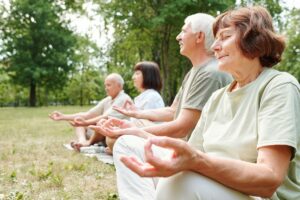Has your elderly loved one been overly stressed, anxious, depressed, or in physical pain lately? If so, maybe they have been on medications, but those might not be helping much. Maybe, your elderly loved one doesn’t want to take medications, but they do want to feel better. There are many natural treatments that might help your elderly loved one and mindfulness is one of those.
Learn about some of the best benefits of mindfulness today and talk to your elderly loved one about them.
Great Stress Management
High stress levels in the elderly can lead to physical pain, memory loss, and other health issues. Has your elderly loved one’s stress levels been insanely high lately? If so, it is important to help them lower those levels as best as you can.

Research shows that mindfulness can help people to reduce stress. It helps them to focus on their breathing, so they don’t get so overwhelmed. It also helps calm their mind, so they can process their thoughts and come up with solutions. Mindfulness practices can help your elderly loved one to learn how to better cope with stress and prevent some stress in the future, as well.
You or an in-home care provider should try getting your elderly loved one to practice mindfulness YouTube guided videos.
Improved Quality of Life
Mindfulness can also help to improve a person’s quality of life. Think of it this way – if someone has high stress and anxiety levels and they are constantly on edge, do you believe they would have a great quality of life? Probably not. However, when they practice and get good at mindfulness, they can reduce these issues which can improve their quality of life.
If your elderly loved one hasn’t been doing so great mentally or emotionally, encourage them to practice any mindfulness techniques. Even if you or a home care provider can only get your elderly loved one to practice mindfulness techniques for 5 minutes a day, that may be all they need to see how beneficial it can be.
More Motivation
Has your elderly loved one had a lack of motivation recently? Maybe, they just can’t seem to focus on one task, project, or activity. They also may not feel like doing anything, no matter how much they truly want to do it.
If your elderly loved one’s motivation is lacking lately, you should encourage them to practice mindfulness. Research shows that mindfulness exercises can help people to renew their passion for goals and activities. By doing this, your elderly loved one may have more motivation to get things done.
Conclusion
These are some of the many mindfulness benefits that you should talk to your elderly loved one about. Now that you are aware of these benefits, hopefully, you can start encouraging your elderly loved one to practice mindfulness every day – even if that is only for 5 or 10 minutes a day. If you can’t be there to help your parent practice the skills they have learned, in-home care providers can help your senior do yoga, meditate, remember medications and engage in activities that reduce stress. In-home care offers many benefits beyond personal care and companionship.
Sources
https://www.apa.org/monitor/2012/07-08/ce-corner


